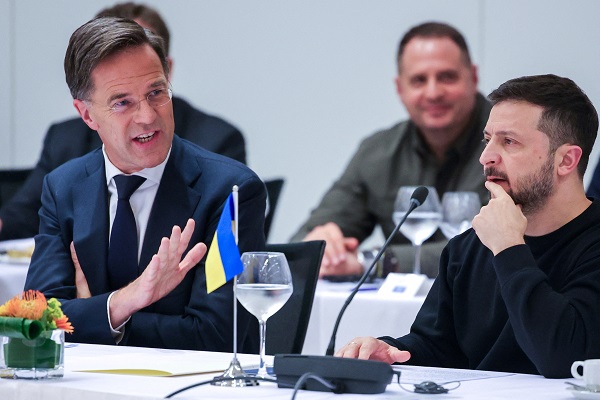 (L-R) NATO Secretary General Mark Rutte speaks with Ukraine's President Volodymyr Zelensky at the NATO-Ukraine Council Working Dinner attended by NATO Defence Ministers, at NATO Headquarters in Brussels, Belgium, 17 October 2024;
Credit: Olivier Matthys/Pool via Reuters
(L-R) NATO Secretary General Mark Rutte speaks with Ukraine's President Volodymyr Zelensky at the NATO-Ukraine Council Working Dinner attended by NATO Defence Ministers, at NATO Headquarters in Brussels, Belgium, 17 October 2024;
Credit: Olivier Matthys/Pool via Reuters
BRUSSELS (Reuters) - Ukrainian President Volodymyr Zelensky pitched his "victory plan" to the European Union and NATO on Thursday 17 October 2024, receiving pledges of continued support but no endorsement from key allies of his call for an immediate NATO-membership invitation.
Zelensky said Ukraine's supporters would be making a "big mistake" and strengthen Russia if they did not back the plan, which also calls for more weapons and permission to use Western long-range missiles to strike deep inside Russia.
Zelensky, visiting Brussels at a critical time in Ukraine's fight against Moscow's invasion, told a summit of EU leaders the plan would deal a "decisive" blow to Russian President Vladimir Putin.
"Putin must respect our strength, not have the free world tremble at his threats," Zelensky said.
At NATO headquarters, Secretary-General Mark Rutte reassured Zelensky Ukraine would join the Western military alliance - reiterating a long-standing pledge - but stopped short of backing the call for an immediate invitation.
"Ukraine will be in NATO. Until that happens, we will make sure that Ukraine has everything it needs to prevail," he said, standing beside Zelensky at a press conference.
When Zelensky declared Ukraine would not lose if its partners maintained their unity, Rutte interrupted to declare: "And we will not lose that unity. You can count on that."
"And my message today to Vladimir Putin is that if he thinks we will, we will not," he added.
Zelensky is presenting his plan to Ukraine's allies as Moscow's forces advance in the east, a bleak winter of power cuts looms and a US presidential election casts uncertainty over the future of Western support.
Message to Putin
Putin has cited Ukraine's potential NATO membership as a reason for the invasion.
Zelensky argued that formally inviting Ukraine to join NATO would make clear to Russia that Putin could not win.
But NATO has said Ukraine cannot join while at war as this would draw the alliance directly into conflict with Russia. Several key members, such as the United States and Germany, have been particularly wary about issuing a membership invitation.
Asked about Zelensky's plan as he arrived at the EU summit, German Chancellor Olaf Scholz said: "You know Germany's position on the issues involved. This will not change."
Russia denounced Zelensky's plan on Wednesday 16 October 2024, saying he was trying to push NATO into a direct conflict with Moscow.
Zelensky has argued NATO could formally invite Ukraine to join NATO now, even if membership comes further down the line.
Much will now depend on whether NATO's predominant power, Washington, is open to changing its position. It has shown no sign it is ready to do so.
British Defence Secretary John Healey described the plan as a basis for discussion and said London wanted it to succeed.
"It's the basis for leveraging the sort of support that Ukraine needs now, in the remaining weeks of this year, as well as into the period ahead," he told reporters at NATO headquarters.
Some of Kyiv's closest allies in the Baltic states voiced support for Zelensky's initiative. Lithuanian Defence Minister Laurynas Kasciunas backed the specific call for immediate NATO membership.
"The invitation is a first stage, but it's a real irreversibility, a point of no return," Kasciunas said.
Zelensky's plan also calls for a "comprehensive non-nuclear strategic deterrence package" in Ukraine to protect against threats from Russia, which he has not detailed.
In addition, it offers the West a role in developing Ukraine's natural mineral resources and proposes Ukrainian troops could replace some US forces in Europe.








